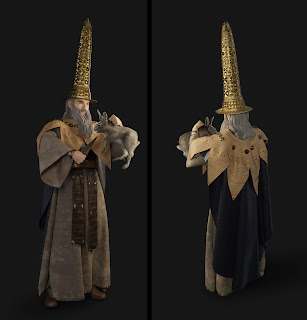Lore24 Jan 3: Priests, Priestesses, Champions, and Mystics Oh My…
There are many ways for a person to relate to the gods. Most people don’t dedicate themselves to a specific god, but offer sacrifices and prayers to the gods as they relate to what’s happening in their lives. If you are building a house, you might go to the temple of Atarash, the Scorching Flame and pray for him to help you get the mudbricks right, and offer a sacrifice so that he doesn’t burn down the house once it’s built. You might also stop by the temple of Moss-Covered Nir of the Woods and promise burn some expensive incense in their name if the cedar trees you want to use for the roof are of excellent quality. When going fishing, you probably say a prayer to Brilliant-Scaled Esir, so that she sends some of her children to your net, and when a family member dies, you take a white goat to the temple of the White Lady and ask her to grant easy passage to the Underworld.
A person might also join the clergy of a specific god of goddess, becoming a priest or priestess. Usually gods have priests and goddesses have priestess, but some deities don’t care about the gender of their clergy, and some have more exotic gender preferences. That said, one doesn’t necessarily stay in the clergy of a single deity. It is for example quite popular for young girls to join the priesthood of one of the virgin goddesses, then after they get married to transfer to the clergy of some mother goddess, and if they live long enough, eventually end their career in the priesthood of one of the crone goddesses. This is viewed as only proper, since the clergy don’t get paid, and so joining is more of a side profession for independently wealthy individuals, who are still expected to live their civilian lives and advance their normal careers. Of course becoming a priest is one of the easier ways to become literate and learn mathematics, astrology, medicine, and alchemy, which allows one to get a job in the local state bureaucracy, so it is popular with young nobles. It is also a great way to get connections among the more senior politicians. Members of the clergy rarely get magic from the gods to use as they will, but the gods sometimes perform miracles if they ask. Also the temples usually have a grand library where those with innate magical abilities can learn a few spells.
One may also give themselves totally to the gods, usually leaving civilization entirely and living as hermits in the mountains or in small monastic groups. These mystics are looked upon as holy, and their advice is sought if normal prayer and sacrifice didn’t bring the desired results. They are also protected by the gods, and usually the law as well. Mystics may gain incredible knowledge during their lifetime, so it’s not unusual to see people asking them more mundane questions, such as the history and location of long-forgotten artifacts, possible weaknesses of unusually tough monsters, and sometimes even about what the future might hold.
Lastly one may be chosen by a specific god or goddess to be their champion. Champions have to follow the directives of their deity, advance the deity’s goals, and undermine the deity’s enemies. In exchange they are granted magical abilities, which they might use as they see fit, as long as the use doesn’t go against the deity’s principles.
As one might imagine, being in the clergy or a mystic isn’t conducive to the adventuring lifestyle, but being a divine champion very much is.
Image by Thomas Simeth




Comments
Post a Comment